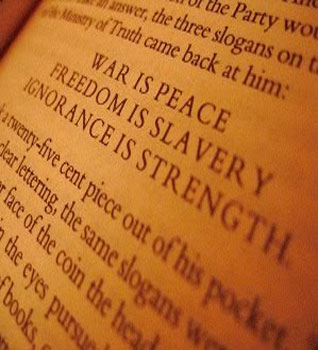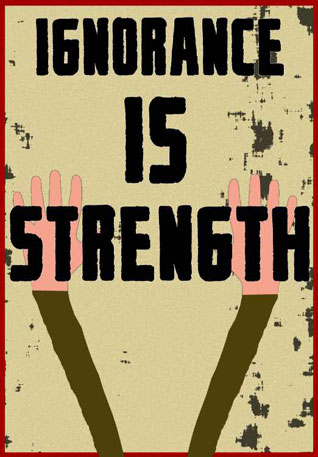Columnists
DoubleThink & India's Orwellian Ministry of Truth
SARBPREET SINGH
In an essay titled “Notes On Nationalism“, published in October 1945 in Polemic: A Magazine of Philosophy, Psychology & Aesthetics, George Orwell wrote:
Every nationalist is haunted by the belief that the past can be altered. He spends part of his time in a fantasy world in which things happen as they should -- in which, for example, the Spanish Armada was a success or the Russian Revolution was crushed in 1918 -- and he will transfer fragments of this world to the history books whenever possible.
Much of the propagandist writing of our time amounts to plain forgery. Material facts are suppressed, dates altered, quotations removed from their context and doctored so as to change their meaning. Events which it is felt ought not to have happened are left unmentioned and ultimately denied.
Historical revisionism is either the legitimate, scholarly re-examination of existing knowledge about an historical event, or the illegitimate distortion of history to depict selected events in a more or less favorable light.
This second, more insidious form of historical revisionism is what Orwell addresses in his essay.
The ‘largest democracy in the world’, India, has seen fit to propel Narendra Modi, an ultra-nationalist into power, giving him a clear and strong mandate to set a course that will jump-start the nation’s stagnant economy. His dubious track record with the economy of the state of Gujarat as its Chief Minister is often touted as evidence of his capability to lead the country.
Salivating over the prospects of vast profits for global corporations in a resurgent India, Western governments, including President Obama’s administration, have joined the mad scramble to propitiate the new deity of Indian progress with his pro-business track record.
In the process, another very real and well known aspect of his track record is surreptitiously being swept under the rug.
Writing in the Express Tribune, a year ago, Markandey Katju, a former Indian Supreme Court Justice observed:
I was flying from Delhi to Bhopal recently. Sitting beside me was a Gujarati businessman. I asked him his opinion of Modi. He was all praise for him. I interjected and asked him about the killings of over 2,000 Muslims in 2002 in Gujarat. He replied that Muslims were always creating problems in Gujarat, but
after 2002, they have been put in their place and there has been peace. I told him it was the peace of the graveyard, and peace can never last long unless it was coupled with justice. At this remark, he took offence and changed his seat on the plane.
It is claimed by Modi’s supporters that what happened in Gujarat was only a ‘spontaneous’ reaction of Hindus to the killings of 59 Hindus in a train in Godhra. I do not buy this story. Firstly, there is still mystery attached to what exactly happened in Godhra, and who was responsible for the killings. Secondly, the persons who were responsible for the Godhra killings should certainly be identified and given harsh punishment, but how does this justify the attack on the entire Muslim community in Gujarat?
Muslims are only nine per cent of the total population of Gujarat, the rest being mostly Hindus. In 2002, Muslims were massacred, their homes burnt and other horrible crimes committed against them.
To call the killings of Muslims as a spontaneous reaction reminds one of Kristallnacht in Germany in November 1938, when the entire Jewish community there was attacked, many killed, their synagogues burnt, shops vandalized, etc. after a German diplomat in Paris was shot by a Jewish youngster whose family had been persecuted by the Nazis.
The Nazis claimed that this was a ‘spontaneous’ reaction, but, in fact, it was planned and executed by the authorities using fanatic mobs.
The widespread attempt by Modi’s supporters to re-cast the 2002 anti-Muslim Gujarat pogrom is a classic example of the kind of historical revisionism that Orwell objects to in his essay.
Justice Katju’s concluding words in the Tribune piece are worth paying attention to; after pointing to the fact that the vaunted Gujarat economic miracle has benefited mostly large corporations while doing nothing to alleviate poverty, he goes on to say:
To those who talk of the development of Gujarat under Modi, I ask this question: should the malnourished children of Gujarat eat the roads, electricity and factories, which Modi has created? I appeal to Indians to consider all this if they are really concerned about the nation’s future; otherwise, they may make the same mistake that the Germans made in 1933.
A year later, the Indian electorate has spoken. It has bought into the Modi’s promises of economic growth and prosperity. In the process it has abjured mindfulness by tacitly embracing the revisionist narrative of the Gujarat pogrom peddled by his supporters.
The mistake that Justice Katju warned the Indian electorate of has been made.
Chilling as this is, there is more to come.
Kakatiya University in Warangal isn’t exactly a household name in India. Its Department of History & Tourism Management (yes, this is not a joke) is definitely not considered to be an intellectual powerhouse that produces scholars of great repute.
Sudershan Rao Yellapragada, erstwhile professor of history and a prolific blogger, wrote an article several years ago titled: Indian Caste System: A Reappraisal, from which I reproduce the following nugget:
Caste system as all other social and economic systems has come under fire in the modern times. With the changes in the political structure from at least medieval times, Indian religion, which is popularly known as Hinduism, was threatened of its very existence during the Muslim invasions at the wake of the second millennium. However, Islam could not make a heavy impact on the demographical texture of India, because after three hundred years of Muslim rule, the rulers pursuing alien religion had to strike a compromise with the Hindu subjects. Hindus at large exhibited preparedness to lay even their lives or pay heavy penalties for pursuing their Dharma as it is said in the Bhagawad Gita that even death might be preferred for being steadfast in one's own dharma. Most of the questionable social customs in the Indian society as pointed out by the English educated Indian intellectuals and the Western scholars could be traced to this period of Muslim rule in north India spanning over seven centuries. During this period, to save the honor of their women and dharma at large, medieval Pundits rewrote sastras with some stringent conditions, which attracted the condemnation and criticism of the present intellectuals who could not see through the historical reasons for such interpolations.
The thrust of Prof. Rao’s song is essentially this: the Hindu Caste System is really a benign institution and its characterization as a savage instrument of centuries-long systematic and institutionalized oppression can be attributed to mostly two factors -- misrepresentations by Westerners and western-educated Indian intellectuals (who in other writings by Prof. Rao are said to be of Marxist bent) and purely understandable mores that had to be established by Brahmins to preserve the Hindu way of life in reaction to the depredations of evil Muslim invaders!
Those of my readers who are chortling, would be well advised to stop immediately.
This is not funny at all. This paragon of intellectual excellence, this mandarin of historiography was recently appointed by Narendra Modi’s government to the Chair of the Indian Council for Historical Research (ICHR)!
The ICHR is an agency of the Indian government which funds historical research. According to its website, its objectives include:
• to bring historians together and provide a forum for exchange of views between them
• to give a national direction to an objective and scientific writing of history and to have rational presentation and interpretation of history
• to promote, accelerate and coordinate research in history with special emphasis on areas which have not received adequate attention so far
• to promote and coordinated a balanced distribution of research effort over different areas
The academic community in India is in a furor over Prof. Rao’s appointment, who soon after his appointment caused controversy by alleging Marxist influence on Indian historical studies and western-inspired methods of research.
He also told interviewers that he believed the Hindu mythological poem-epics, the Ramayana and the Mahabharata, were historically accurate accounts of real events.
Romila Thapar, one of India's most respected historians, said she feared "the ICHR may now turn the clock back ... Historical research in India is no longer limited to trying to prove that the narratives of the ancient texts were historically accurate. We are now perhaps more concerned with what they tell us about our past societies and cultures”.
The appointment of an intellectual lightweight to an important government body that controls the flow of research funds cannot be dismissed as evidence of mere nepotism, ignorance or a lack of intellectual sophistication.
Far from it!
Narendra Modi’s political party, the Bharatiya Janata Party ("BJP"), has never been bashful about its desire to revise the narrative of India’s past.
When last in power, between 1998 and 2004, the BJP unabashedly criticized prominent historians and made efforts to expunge what they characterized as Marxist or western viewpoints from school textbooks.
Big Brother, the lord of Doublethink is in place. The Ministry of Truth has been established. Peace and Love, surely, can’t be far behind.
I fear the electorate does not understand what it has wrought.
July 22, 2014
Conversation about this article
1: Sangat Singh (Kuala Lumpur, Malaysia), July 22, 2014, 8:07 PM.
An erudite expose of things to expect post-election when there are rumbles that honesty is becoming, once again, the earliest victim.
2: Ravinder Singh Kalra (Brampton, Ontario, Canada), July 23, 2014, 12:18 AM.
I currently am in no position to provide my viewpoint on the current world affairs. I do know one thing for sure, though -- ultimately the conscience and then the Truth prevails. Let's keep it simple and pray to the Almighty for giving sumat to all so that we as mankind can focus on scientific exploration of the inner and outer universe to everyone's benefit while giving food, shelter and clothing to every poor soul on earth. Sarbat dA bhalla.






